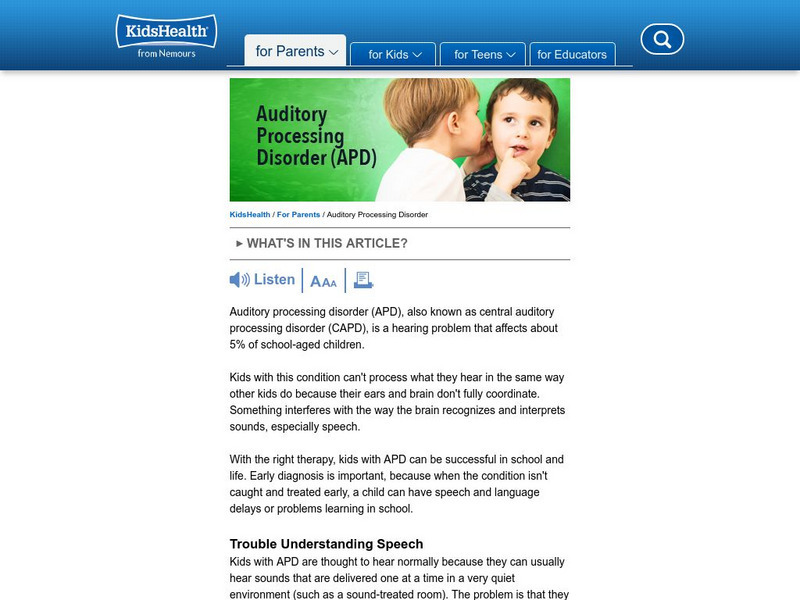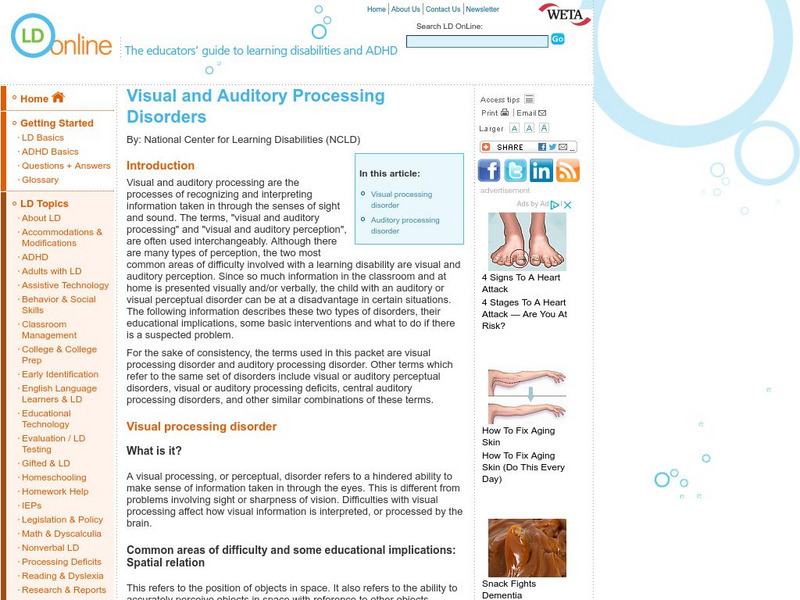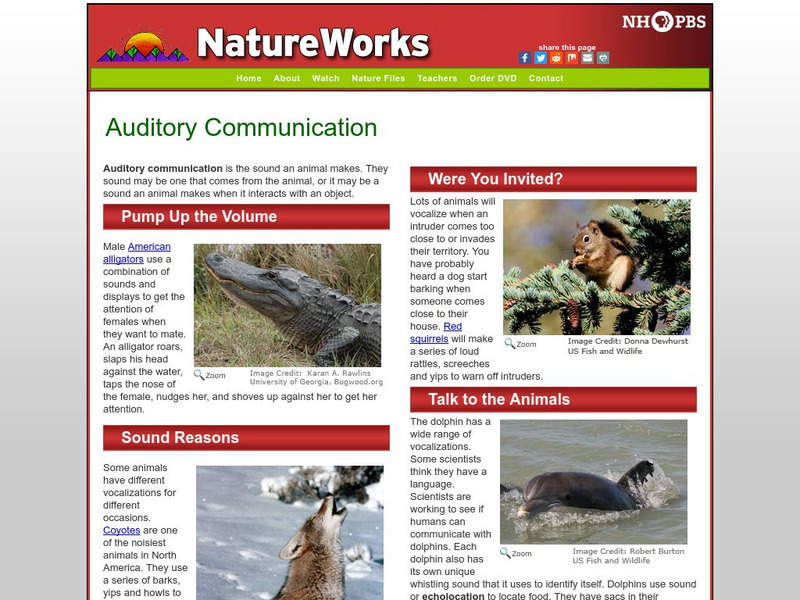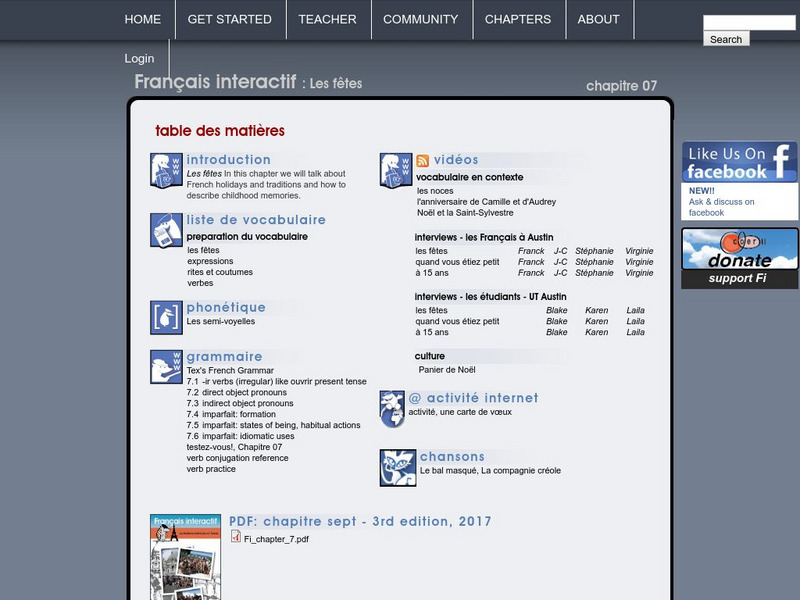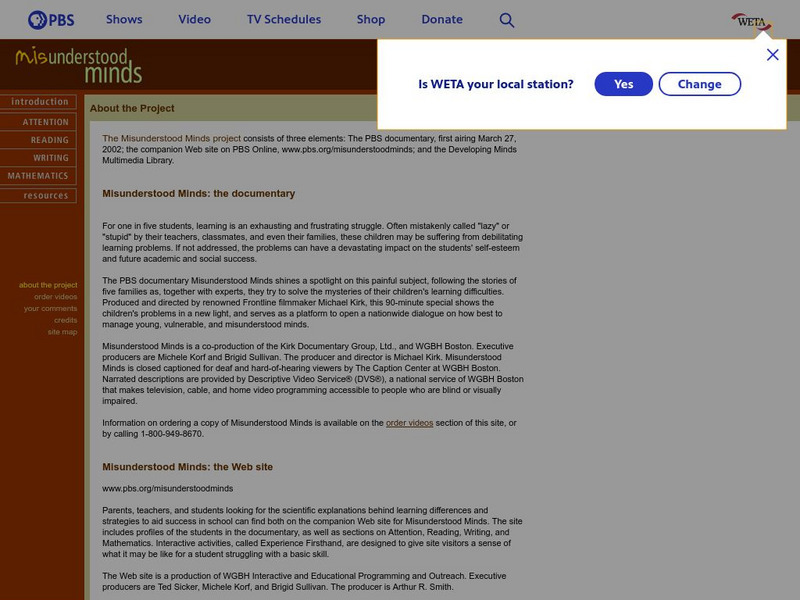Hi, what do you want to do?
Curated OER
Addition and Subtraction using Manipulatives
Sixth graders participate in a question and answer session to begin their understanding. Students complete a practice assignment using color counters. Students' assessment is composed of using color counters to complete an independent...
Curated OER
Sensation and Perception
In this psychology worksheet, high schoolers complete a 5 short answer quiz on sensation and perception. They explain how the five body senses are used to collect information about the environment.
Other
University of Sussex: Auditory Nerve
The University of Sussex defines the auditory nerve and its functions.
Curated OER
Kids Health: Central Auditory Processing Disorder
Central auditory processing disorder is defined here, with examples, symptoms, and causes. This article also includes tips for parents, problem areas for kids with CAPD, and advice for long term success.
Curated OER
Kids Health: Central Auditory Processing Disorder
Central auditory processing disorder is defined here, with examples, symptoms, and causes. This article also includes tips for parents, problem areas for kids with CAPD, and advice for long term success.
National Institutes of Health
Nidcd: Auditory Processing Disorder in Children
This resource discusses and defines Auditory Processing Disorder in Children and also focuses on current trends in research to help this disorder along with additional resources for information.
National Institutes of Health
Nidcd: Auditory Neuropathy
Through a series of topic related questions and answers, this site discusses and thoroughly analyzes the hearing disorder known as auditory neuropathy. Current trends in research are discussed along with the inclusion of a list of...
LD Online
Ld Online: Visual and Auditory Processing Disorders
A reference guide for educators of students with processing or perceptual handicaps. Included are definitions and descriptions of visual and auditory processing disorders, as well as specific difficulties and strategies associated with...
Georgia State University
Georgia State University: Hyper Physics: The Auditory Nerve
A good description and function of the auditory nerve. Diagrams, explanations.
Virginia Commonwealth University
Vcu: Properties of Auditory Nerve Cells
This site has a slide that provides a basic definition and information on the properties of auditory nerve cells in the ear.
PBS
Nh Pbs: Nature Works: Auditory Communication
Describing some of the reasons that animals make sounds, this website gives concrete examples that make acoustic (auditory) communication easy to understand.
Other
University of South Dakota: What Is Your Learning Style?
Find out what learning style you have by taking this interactive quiz. After taking the quiz, read and understand more about the three major learning styles: visual, auditory, and kinesthetic.
PBS
Pbs Teachers: Scientific American: Calls of the Wild: Flies and Stereo
Explore the characteristics of binaural hearing and discover how two ears are utilized in determining the direction of a sound's origin. Produce auditory illusions by reversing and extending the detection site for each ear.
PBS
Pbs Teachers: Dog Ears
Test your auditory memory by matching sounds in this online interactive game. Decode audio clues to decipher the five passwords for Ruff's safe.
Library of Congress
Loc: Abraham Lincoln Primary Source Set
The Library of Congress presents Abraham Lincoln's Primary Source Set. Provides numerous examples of primary documents such as handwritten letters to Mary Todd Lincoln, drafts of speeches, and auditory examples of Lincoln's speech at...
Science Buddies
Science Buddies: Extreme Sounds: Lessons in a Noisy World
Just how loud does a sound have to be for us to hear it? And how loud is too loud for our ears? Learn to measure levels of sound in this project, and discover the amazing auditory range your ears can detect in the noisy world around you.
John F. Kennedy Center
The Kennedy Center: Arts Edge: Rhythm and Art
This curriculum unit from the Kennedy Center's ArtsEdge program presents an introduction to the concept of visual rhythm and explores the intersection of visual and auditory rhythm. The unit is divided into six lessons focusing on...
The Franklin Institute
Franklin Institute: Music to Our Ears
Part of a larger site on the armonica, an instrument created by Ben Franklin. Introduce yourself to the human ear. This section looks at how sound is collected and transmitted and provides diagrams of the parts of the auditory pathway...
TeachEngineering
Teach Engineering: Commanding a Robot Using Sound
Students continue their exploration of the human senses and their engineering counterparts, focusing on the auditory sense. Working in small groups, students design, create and run programs to control the motion of LEGO TaskBots. By...
University of Texas at Austin
Francais Interactif Fetes: Holidays
Wonderful interactive video clips, interviews and vocabulary all relating to French holidays and traditions. Site has excellent cultural information, high quality videos and top-notch auditory practice.
US Department of Labor
Bureau of Labor Statistics: Speech Therapist
Put out by the Department of Labor's Bureau of Labor Statistics, this page from the Occupational Outlook Handbook is dedicated to information related to the Speech Therapist career.
Science Buddies
Science Buddies: Do the Eyes Have It?
Some people have a photographic memory and can memorize anything they see almost instantly. Other people can remember almost anything they hear. Try this experiment to see which type of memory you have.
PBS
Pbs: Misunderstood Minds
A wonderful spotlight on scientific explanations behind learning differences and strategies to aid success in school. Includes profiles of the students in the documentary as well as interactive activities designed to give site visitors a...
TeachEngineering
Teach Engineering: Hearing: How Do Our Ears Work?
Students learn about the anatomy of the ear and how the ears work as a sound sensor. Ear anatomy parts and structures are explained in detail, as well as how sound is transmitted mechanically and then electrically through them to the...
Other popular searches
- Auditory Discrimination
- Auditory Skills
- Auditory Processing
- Auditory Enrichment
- Auditory Discrimination R
- Auditory Learner
- Auditory Discrimination D
- Auditory Discrimination K
- Auditory Discrimination Perk
- Auditory Comprehension
- Auditory Cues
- Auditory Clues








